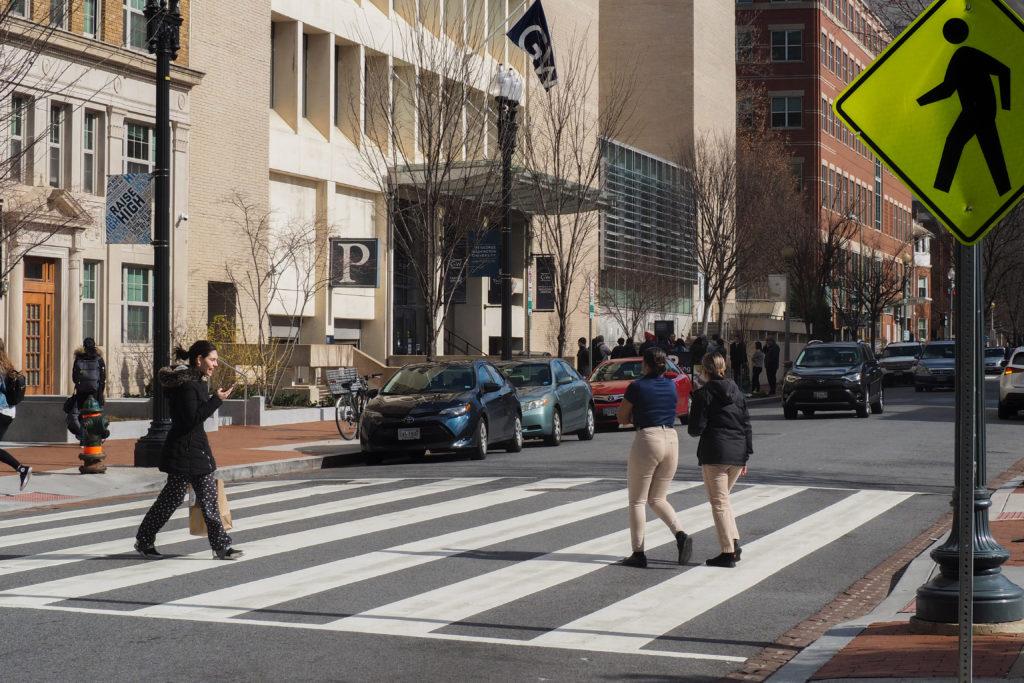More than 90 traffic accidents have occurred on the four blocks of H Street running through campus in the last decade, according to city data.
Roughly one-third of crashes on the street have taken place in the past three years, according to information from Open Data, D.C.’s government database. Transportation experts said the crash numbers do not make the segment of H Street particularly dangerous, but officials could implement more safety measures to ensure student safety.
The section of H Street between 20th and 23rd streets has long raised pedestrian safety concerns among students, officials and local politicians because of the street’s frequent car traffic on workdays and food trucks that obscure pedestrians’ views of the street.
Crashes along the four blocks of H Street have continually decreased over the past three years, with six crashes in 2019 compared to 14 and 11 crashes in 2017 and 2018, respectively, according to government data.
District Department of Transportation director Jeff Marootian said none of the four on-campus intersections along H Street rank in the top 500 of DDOT’s Crash Composite Index, which measures the “rate, severity and cost of reported crashes.”
The intersection of Wisconsin Avenue and M Street in Georgetown was among the 2018 index’s top 10 most dangerous intersections for drivers, cyclists and pedestrians, WTOP reported last year. The intersection at 14th and U streets ranked in the top 10 areas for driver and pedestrian accidents, and the 14th Street and Columbia Road intersection is one of the most dangerous areas for cyclists and scooter riders, according to WTOP.
“We are working to proactively improve safety on our streets across all eight wards of the District, not just after a crash,” Marootian said. “DDOT looks at the number, severity and type of crashes in a given area to determine what interventions are most appropriate.”
He declined to say how H Street’s crash rates compare to the District’s because the department “does not maintain an overall rate of crashes in the District.”
Five pedestrians and a biker have suffered minor injuries as a result of traffic accidents on H Street, and six crashes left drivers with a “major injury,” according to DDOT data. DDOT’s categorization of major injuries includes unconsciousness, broken bones or severe lacerations, while minor injuries include bruises and abrasions.
Two students were hit by cars last year in April and November, both in the block of H Street near District House and Kogan Plaza. Officials installed a new crosswalk between Kogan Plaza and District House in October 2018, more than a decade after they first proposed the crosswalk in 2006.
Foggy Bottom and West End Advisory Neighborhood Commission vice chair and senior James Harnett introduced a resolution at a November meeting asking officials to adopt safety changes, like eliminating certain parking on the street and adding extended pedestrian waiting areas, at H Street intersections.
He said students feel unsafe crossing H Street because cars don’t always stop at the crosswalks or drive the speed limit of 25 miles-per-hour. A vote urging officials to adopt some of the recommendations is scheduled for the ANC meeting on Feb. 19, according to the draft agenda obtained by The Hatchet.
“It only took until about a year and three months ago that we actually were able to get that done,” Harnett said. “It speaks to both the concerns that students have about making sure that government is being reactive to their concerns, but also that when we recognize that changes need to be made that we’re advancing policies and priorities that will actually get us closer to having zero serious injuries and deaths.”
Transportation and traffic planning experts said installing flashing lights along the crosswalk or on roadside signs could better alert pedestrians’ presence to drivers, reducing accidents.
P.S. Sriraj, the director of the University of Illinois at Chicago’s Urban Transportation Center, said crosswalks without a pedestrian sign, like the one outside Kogan Plaza, are not always effective because drivers are inclined to only treat traffic signals as a “warning sign” to stop. He added that the minor crashes on H Street suggest “something fundamentally inadequate” with the street’s design, like traffic buildups that cause “driver angst.”
“Usually when an accident happens, that’s the end result,” Sriraj said. “There might be something that might be symptomatic of an issue with the particular corridor before the accident.”
James Moore, a professor of industrial and systems engineering at the University of Southern California, said he is “skeptical” that mid-block crossings promote pedestrian safety. But Moore added that several unmarked crosswalks in California have since received upgrades like flashers or traffic signals, which better protect pedestrians.
“Frankly, if you want to keep pedestrians safe, you should install a stoplight,” Moore said. “They’re not cheap, but life is valuable.”
He said the stretch of H Street doesn’t appear to be a “particularly dangerous urban environment” based on the number of accidents that have occurred. Moore added that the success of measures to promote pedestrian safety may have been limited because of increasingly distracted drivers and pedestrians.
“Students look more distracted to me, they’re walking around looking at devices, they cross streets looking at devices,” he said. “So I think students are more distracted. I think drivers are more distracted.”
Nagui Rouphail, a civil engineering professor at North Carolina State University, said cities may experience higher crash rates because there are more modes of transportation, like bikers and cars, sharing the same streets.
He said adding a slightly raised street table – a long traffic bump – or flashers that pedestrians activate with a button could reduce traffic incidents between pedestrians and cars.
“At traffic lights there is an expectation that if you stop, pedestrians are going to cross,” Rouphail said. “At mid-block crossings, it’s a little bit trickier because you may not be seeing what pedestrians are crossing because of parked vehicles.”
Lia DeGroot contributed reporting.





